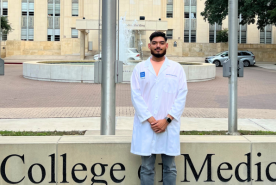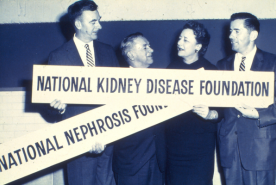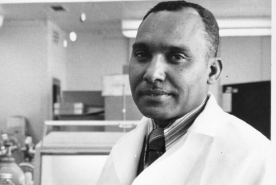Last Updated: September 30, 2024
Medically reviewed by NKF Patient Education Team
What can help you decide
Donating a kidney is a very personal decision. If you need help deciding if donating is right for you or if you’re having any concerns during your decision-making process, you are encouraged to talk with your family members, friends, or transplant team for more guidance. All conversations between you and the transplant team will not be shared with anyone else. Some people who are thinking about donating find it helpful to speak with a faith leader.
While the risks of donating a kidney are pretty low, you should know about the risks of the donor surgery and potential long-term risks of donating a kidney.
You can also speak to someone who has already donated a kidney. NKF has a Peer Mentoring program that connects potential living donors with people who have already donated to ask questions and share their experiences. You can call 855-653-2273 or visit www.kidney.org/peers to learn more.
Things to Think About Before Donating
Before you make the decision to donate a kidney, it's important to think about some things in your life that will need to be taken care of while you’re getting evaluated, are in the hospital for surgery, and during recovery.
- Time off work
- If you’re working, talk to your employer about taking paid or unpaid time off for the evaluation, surgery, and the recovery periods. You can talk to them before your evaluation or wait until you’re approved to donate.
- Care partners (caregivers)
- You will need to think about who your care partners will be while you’re in the hospital and during recovery. Most transplant centers require that you have 2 care partners, and anyone else can help out as needed. Care partners are usually a spouse, parent, adult child, or friend. Your living donor social worker will also help you to identify who your care partners will be during your evaluation.
- Dependent care (child or adult care)
- If you have young children or are responsible for taking care of an adult, you will need to think about who would be able to take over for you during evaluation, surgery, and recovery. There are programs to help cover the costs of dependent care, if needed. Your living donor social worker can talk to you more about your options during evaluation.
- Costs not covered by your recipient’s insurance
- While all medical costs directly related to donation are covered by the recipient’s health insurance, there are other expenses that are not usually covered, including:
- Lodging (hotel), travel (flight or gas) and meals during your evaluation and surgery.
- Childcare (if needed)
- Pet care
- Lost wages, if you’re working
- Your recipient may choose to help pay for these costs out of pocket or through fundraising, but not everyone is able to. There are financial programs that can help to cover these costs, too. Your living donor social worker will talk more with you about your options and see if you qualify during your evaluation.
- While all medical costs directly related to donation are covered by the recipient’s health insurance, there are other expenses that are not usually covered, including:
If you have someone in mind who you’d like to donate directly to and the team says you’re compatible (or a good match), you can choose to donate directly to them. If you’re not compatible with the person who you want to donate to, ask the transplant team about a Kidney Paired Donation (also known as Paired Exchange.)
If you’d like to donate to anyone who needs a kidney, the team will talk to you about donating directly to someone on their waiting list in need of a kidney or being a part of a kidney donor chain. Whatever you decide, the living donor team will support you and talk to you about all your options.
What happens if you decide not to donate
It’s important to remember that a living donor has full control over if they donate or not, anytime during the process, even after being approved and up to the time of surgery. You can tell the transplant team at any point that you no longer wish to donate or move forward in the process. You should never feel pressured to donate in any way and should not feel guilty or bad if you change your mind.
Questions to ask yourself to help you decide if living donation is right for you
There is a lot to consider when donating a kidney. These questions can help explore your feelings, your relationship (if any) to the donor, your expectations, your motivation for donating, and whether you are ready and willing to donate.
Do I Know Enough about Living Donation?
- Why do I want to donate my organ to someone else?
- Do I feel I have information to make an informed decision to donate?
- Do I have any unanswered questions?
- Have I considered all the benefits and risks of donation and surgery for myself and for my family?
My Health
- Am I in good physical shape and able to have surgery?
- Am I prepared to deal with pain after surgery and discomfort from surgery?
- Is there anything I need to do to improve my physical health and make recovery easier, such as exercising, quitting smoking, or losing weight? Will I need help or support to do this?
- Am I prepared to reach out to the transplant team or other mental health professional if I feel that I’m having feelings of depression or anxiety after I donate?
- Can I handle a complication that may delay my recovery?
My Emotions
- Have I been honest with myself about why I want to donate a kidney?
- Am I expecting anything in return for my donation? (For example, am I hoping for attention, gratitude, a better relationship with the recipient, or other things?)
- Who can I depend on for physical and emotional support during surgery and recovery?
- How will I feel if the recipient is not grateful in the way I imagined?
- Will I be able to cope if my relationship with the recipient becomes strained or difficult?
- How will I feel if the kidney fails?
- Will anyone be upset with me if I do not donate? If so, who?
My Finances
- How would living donation affect me financially? Would I lose wages during my recovery? Am I able to get paid leave from my employer?
- Have I thought about my other responsibilities and how I will manage them during my recovery period (such as my job, volunteer commitments, young children?)
- Will I be changing my job or occupation in the near future? If so, would living donation affect my future employability?
Who can help?
Your transplant center has a social worker who can help you make this decision. The social worker and Independent Living Donor Advocate that you’ll meet at your evaluation are there to assist you personally and answer all your questions. Your discussions will be kept private and confidential.
You can also call the National Kidney Foundation's NKF Cares Help Line toll-free at 1.855.653.2273 or email nkfcares@kidney.org.
Resources
- Talk to someone who’s donated: NKF PEERS | NKF PEERS En Español
- Ask questions and get help finding a transplant center: NKF CARES


















